The state of Indiana was among the firsts to promote and support telemedicine and Telehealth in the United States of America. Its local government and medical agencies exerted efforts to know the ropes on this mode of practice to formulate regulations that would be fitting and best for Hoosier practitioners and patients alike.
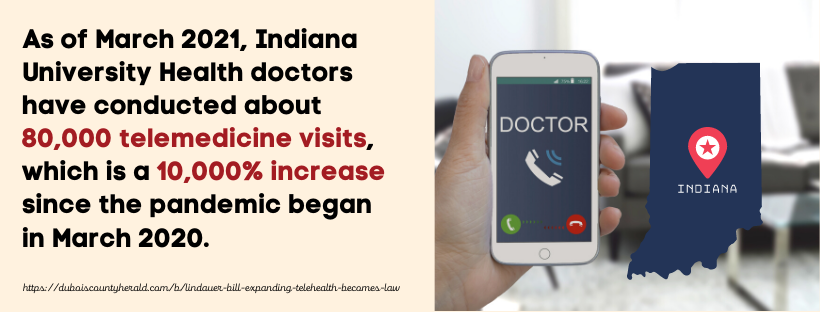
Delivering health care services using electronic communications and information technology between a provider and a patient in different locations is what telemedicine in Indiana is all about. It involves the use of secure videoconferencing, interactive audio-using store-and-forward technology, and remote patient monitoring technology. It is also used to render examinations and other medical services.
On the other hand, Telehealth’s definition involves the consultation, delivery of information, diagnosis, health assessment, intervention, and supervision of patients using telecommunications and information technology. It also includes scheduled home remote monitoring of the patient’s clinical data using technological equipment.
However, audio-only communication, electronic mail, facsimile transmission, instant messaging conversation, internet consultation, internet questionnaire, telephone call, and telephone consultations—although known as electronic forms of communication—are not considered part of telemedicine in Indiana.
When it comes to the state’s reimbursement policies, only videoconferencing consultations and remote patient monitoring services are considered covered. The guidelines also do not provide for an exclusive list of covered services and eligible providers. Instead, it provides a list of the type of providers not covered by the Indiana Health Coverage Programs.
Unmatched Feature of Telemedicine in Indiana
The Indiana Telemedicine Pilot Program gave way to the major changes in the policies and practice of telemedicine in the state. Its success encouraged state legislators to introduce new bills and amend existing laws to enhance further the provider’s practice and the patient’s overall telemedicine experience.
Indiana State Telemedicine Laws and Policies
Who can practice telemedicine in Indiana?
In addition to an active and unrestricted license issued by the Indiana Professional Licensing Agency (IPLA), medical professionals who want to extend their practice into telemedicine must also file an individual and employer Telehealth Provider Certification before the agency. These certifications can be filed online through the practitioner’s AccessIndiana account.
The following eligible health care practitioners can apply for telehealth Provider Certifications:
- Advanced Practice Registered Nurse
- Athletic Trainer
- Addiction Counselor
- Audiologist
- Bachelor Social Worker
- Chiropractor
- Clinical Addiction Counselor
- Clinical Social Worker
- Dental Faculty
- Dental Hygienist
- Dental Resident
- Dentist
- Diabetes Educator
- Dietitian
- Genetic Counselor
- Licensed Practical Nurse
- Marriage and Family Therapist
- Mental Health Counselor
- Occupational Therapist
- Optometrist
- Osteopathic Physician
- Pharmacist
- Physical Therapist
- Physician
- Physician Assistant
- Podiatrist
- Psychologist
- Registered Nurse
- Respiratory Care Practitioner
- Social Worker
- Speech Pathologist
- Veterinarian
This list is exclusive, and only practitioners falling in any of these fields or specializations are qualified to expand their practice into telemedicine.
Out-of-State Providers
Out-of-state providers, their employer, or contractor may only be allowed to practice medicine in the state of Indiana or render health care services to persons situated in Indiana if they agree to comply with the Indiana Substantive and Procedural Laws and willingly subject themselves to the state’s court jurisdiction waiving their rights to avail of other court jurisdictions. This must be certified in writing to the Indiana Professional Licensing Agency and regularly renewed together with their license. Exempted from the filing of this certification are providers who have been predominantly practicing in Indiana.
The IPLA, upon verification, will then issue the out-of-state provider a corresponding license and Telemedicine Provider Certification. These providers may also be allowed to immediately engage in telemedicine services if they include it as a subtype in their enrollment.
Interstate Medical Licensure Compact
Indiana is not a member of the Interstate Medical Licensure Compact (IMLC), nor does it have any pending legislation on the matter. The state has its own existing licensing and certification policies for out-of-state providers to protect patients and the medical profession by commanding jurisdiction over overall medical practice happening within state boundaries.
EMS Personnel Licensure Interstate Compact
The EMS Personnel Licensure Interstate Compact enacted through the REPLICA allows licensed emergency medical services professionals to extend their practice to other member states in qualified and specific circumstances.
Indiana is one of the 21 states that have enacted its legislation for the Compact back on March 11, 2020. The key objective of the Compact is to allow emergency medical services (EMS) personnel immediate legal recognition by EMS offices in other member states. This facilitates the movement of the response team in medical emergencies across state boundaries allowing patients to receive timely medical attention that can save their lives.
Interested parties must possess the following qualifications:
- At least 18 years old
- A passer of the Emergency Medical Technicians (EMT), Advanced Emergency Medical Technicians (AEMT), or Paramedic level initial licensure exam
- Holder of an unrestricted license
- Practicing in good standing in Indiana
- Supervised by the EMD Medical Director
The EMS Compact is administrated by Commissioners composed of delegates from all member states who vote and decide on all matters or issues related to the practice. As of this date, the state of Indiana’s Commissioner is Kraig Kinney from the Office of the State Fire Marshal.
Nurse Licensure Compact
Indiana became a full Nurse Licensure Compact (NLC) member-state on July 1, 2020. Since then, nurses have been able to apply and obtain a compact license through the state’s Board of Nursing. Active Indiana nursing license holders will have to declare Indiana as their Primary State of Residence to qualify under the state. Those with felony or misdemeanor convictions are disqualified from applying.
Through the Compact, registered nurses and licensed practical nurses can now possess a compact or multistate license that gives them the privilege to practice in all other member-states aside from their home state. Meanwhile, Advanced practice registered nurses (APRNs) must secure individual licenses from the states where they intend to extend their practice as they are not covered under the Compact.
One must put in mind that the compact license is a privilege and not a right. Indiana, serving as the Primary State of Residence, can revoke it and take disciplinary measures. Instances when this can happen include participation in an alternative program, adverse actions, and the existence of disqualifying offenses.
Standard of Care
Telemedicine providers are held to the same level and standard of care expected when health care professionals render services in-person. A provider-patient relationship must be established, and it can be done via telemedicine. For this kind of relationship to be said to exist validly, the following minimum requirements must be complied with by the health care provider:
- Get the patient’s name, location, and contact details
- Give their name, credentials, and location
- Obtain the patient’s informed consent
- Gather the patient’s medical history and all other relevant information that must be factored in coming up with an accurate diagnosis
- Discuss the final diagnosis with the patient by showing evidence such as laboratory and test results
- Lay down all available treatment options for the patient as well as the corresponding benefits and risks
- Record both the start and stop times of all encounters
- Maintain an accurate and up-to-date medical record of the patient
- Inform the patient’s primary care provider, with their consent, of any new findings, treatment approach, prescriptions, and other matters related to the health of the patient
- Provide follow-up care and instructions, if necessary
All other information must be accurately documented and maintained as patient medical records at both the originating and distant sites. The telemedicine provider must also issue a summary of the visit to the patient, which includes all the exchange, decided treatment plan, prescriptions, the technology utilized for the visit, and other relevant information.
The telemedicine provider must coordinate and communicate with the patient’s primary care physician if the patient permits the same. Lastly, the provider must ensure that the patient goes for a traditional clinical evaluation at least once a year.
Health care providers must always have a written protocol ready just in case the patient’s medical case would warrant an in-person visit.
Informed Consent
Patients must always be given the freedom to choose between a telemedicine consultation and a traditional in-person visit. No health care practitioner may impose telehealth modalities when it comes to the delivery of medical services.
If the patient has already given consent to the health care provider during a prior in-person visit, a separate and additional written consent before the same health care provider delivers telemedicine services to that patient is no longer needed. However, the patient’s informed consent must be obtained at the originating site before delivering any telemedicine service. The consent may be in written, oral, or digital form.
Confidentiality
The standard to be followed for the confidentiality, privacy, and security of the patients’ health information is outlined in the Health Insurance Portability and Accountability Act (HIPAA). The state of Indiana has not issued its guidelines concerning the handling of medical information transmitted through telemedicine, but the federal rules are strictly implemented by regulatory boards and observed by providers.
E-prescription
A provider-patient relationship must exist before any prescription may be issued by the telemedicine prescriber. The provider must have thoroughly reviewed the patient’s evaluation, medical history, physical examination, underlying conditions, and existing medication regimen for a prescription to have been issued following the standard of care and diligence expected of them. This is to avoid any contraindication or drug interaction that may cause more harm than good to the patient.
In prescribing controlled substances, the telemedicine prescriber must:
- Be a holder of a valid controlled substance registration
- Comply with federal and state laws as well as the requirements provided under the INSPECT program
- Examine the patient in-person either by the telemedicine provider prescribing the medication or by other Indiana-licensed health care provider
- Existence of a treatment plan prepared by the examining physician
- Give a medically appropriate diagnosis based on the findings of the examination and the prepared treatment plan
- Follow the treatment plan in deciding what medications to be prescribe
An instance when an Indiana-licensed provider or prescriber may do away with the required prior examination of the patient is when they have met the applicable standard of care when treating a patient and prescribes the medication within the limits of their scope of practice and certification. The subject-controlled substance must not be an abortion-inducing drug or an opioid unless it is part of the treatment plan as a partial agonist such as buprenorphine for an opioid-dependent patient.
As for prescriptions concerning medical devices, telemedicine technology that would make the prescriber capable of giving an informed diagnosis and treatment plan shall be utilized. Prescription of ophthalmic devices such as glasses, contact lenses, and low vision devices cannot be issued via telemedicine without a prior in-person examination.
Pharmacists could not be charged for violation of state laws on dispensing controlled substances for filling prescriptions if they did so without knowing that a telemedicine provider prescribed it.
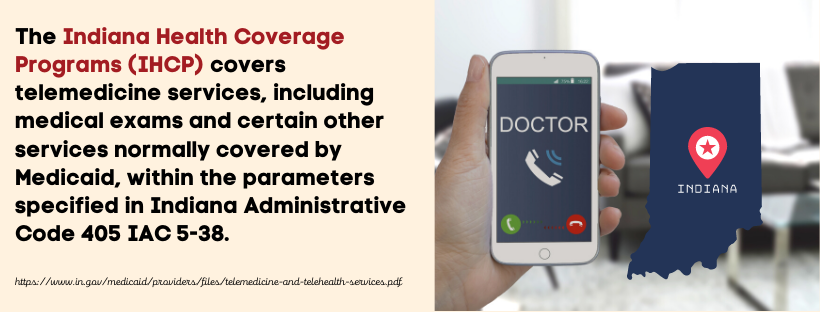
State Reimbursement Policy
The Indiana Health Coverage Programs or IHCP recognizes telemedicine services, including medical exams, as covered and reimbursable health care services. Eligible telemedicine services also carry with them the same limitations and restrictions as they would when rendered in-person.
One of the main requirements for a telemedicine service to be reimbursable is the physical presence and participation of the patient during the virtual visit. The setting can either be inpatient, in-office, or outpatient.
Before any telemedicine service is rendered, the provider must ascertain if a health care professional at the originating site is medically necessary and must ensure that one is at the patient’s disposal if it is the case.
Although recognized as a valid modality in Indiana, it is not considered a separately reimbursable telemedicine service. One of the reasons is that the presence of the patient is not needed in this modality. However, it can still be used to facilitate the delivery of or in combination with other covered telemedicine services.
The Indiana Health Coverage Programs do not cover the following telemedicine provider types:
- Ambulatory surgical centers
- Anesthesia services or nurse anesthetist services
- Audiological services
- Care coordination services
- Chiropractic services
- Dependable medical equipment and home medical equipment providers
- Health care services rendered under a Medicaid home and community-based services waiver
- Home health agencies or services
- Laboratory services
- Long-term care facilities such as community residential facilities for the developmentally disabled, intermediate care facilities, and nursing facilities
- Optical or optometric services
- Outpatient surgical services
- Physical therapy services
- Podiatric Services
- Provider to provider consultations
- Radiological services
- Transportation services
Consultation between providers is also not considered a telemedicine service and, therefore, not reimbursable.
In the case of out-of-state providers, they must be registered with a rendering or billing provider classification to be eligible for reimbursement for telemedicine services rendered to patients situated in the state of Indiana at the time of delivery of the subject health care services.
What services are reimbursed in Indiana?
By IHCP – IN Medicaid:
- Live Video
X Store-and-Forward
- Remote Patient Monitoring
X Stand-alone or combination of Audio-only Telephone Calls, E-mail, Instant Messaging, or Facsimile
- Live Video
Telemedicine services delivered through video conferencing by the following facilities shall be reimbursed as provided for in the Indiana Code:
- Community Mental Health Centers
- Critical Access Hospitals
- Federally Qualified Health Centers
- Physician’s Office
- Rural Health Clinics
- Other eligible providers
If these facilities serve as originating sites, the presence of the health care professional must be proven to be medically necessary for reimbursement that is separate from the originating site facility fee. The service, its components, and the reason behind the medical necessity must be properly documented for post-payment review.
An FQHC or RHC cannot be reimbursed for a separate facility or transmission fee for the sole reason that it served as an originating site and the presence of the health care professional is not medically necessary. These two conditions must be both present for the services rendered at FQHCs and RHCs to be reimbursable.
Health care services for End-Stage Renal Disease (ESRD) patients may be rendered via telemedicine, but a mandatory traditional clinical visit must be conducted at least once a month to examine the vascular access site properly.
Psychotherapy and psychiatric diagnostic services are also reimbursable services even when delivered through telemedicine modalities.
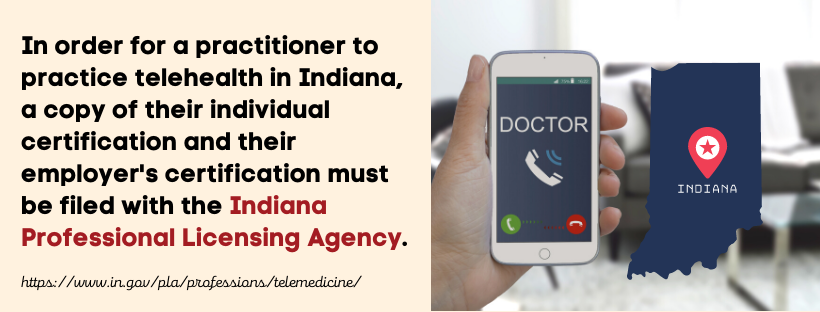
Remote Patient Monitoring
Home health agencies can avail of reimbursements for health care services rendered via remote patient monitoring modes to patients who have been diagnosed with congestive heart failure, chronic obstructive pulmonary disease (COPD), or diabetes.
The physician’s need for such home health services must be certified to oversee the care of the diagnosed patient they have seen in person. Prior authorization, which is usually valid for up to 60 days, must be obtained.
The subject remote patient monitoring services must occur within the immediately preceding twelve months from an emergency room visit, or an inpatient stay. If the emergency visit resulted in an admission making it an inpatient hospital stay, it should only be counted as one event. The facility’s consent where in-person services were rendered to the patient must be obtained before delivering remote patient monitoring services.
When the physician has given a written request to a registered nurse to read the health information transmitted by the patient through this modality, the physician’s written order shall govern and must be followed for the entire process. The monitoring criteria and interventions for the treatment shall be following the plan of care provided.
By Private Payer or other health care service plan providers:
Health, accident, and sickness insurance must include a clause providing coverage for telemedicine services similar to that provided for in-person medical services. Excluded from compliance with this rule are dental and vision insurance policies.
Behavioral health services, consultations, medical exams, substance abuse evaluations, and treatment are reimbursable as telemedicine services. These services cannot be subjected to a coinsurance, deductible, or dollar limit that exceeds the same healthcare services rates when rendered in person.
Up to this date, there is still no explicit payment parity being implemented in Indiana. However, insurance companies are not prohibited from giving greater benefits to their insured members than the minimum required coverage under state reimbursement policies.
Who can avail of these reimbursements?
The following providers are eligible to avail of the reimbursements extended by both state and private insurance plan providers to services rendered via telemedicine:
- Advanced Practice Registered Nurses (APRNs)
- Clinical Nurse Specialists
- Clinical Psychologists
- Community Mental Health Centers
- Critical Access Hospitals
- Federally Qualified Health Centers
- Home Health Agencies
- Nurse-Midwives
- Nurse Practitioners
- Optometrists
- Physicians
- Physician Assistant
- Podiatrists
- Rural Health Clinics
To determine whether a provider is eligible, the rule to be followed is that what is not included is deemed excluded. Hence, other providers not included in the list of provider types not covered under the Indiana Health Coverage Programs (IHCP) are considered reimbursable.
Public Health Emergency (PHE)
The state government issued directives, executive orders, as temporary adjustments during the recent public health emergency. State officials and medical professionals have deemed them necessary to manage the state’s health care response to those afflicted with Covid-19, prevent the virus from further spreading, and keep the active cases in the state from going up. Below are some of these issuances to serve as guidance for both providers and patients at these trying times:
- Non-active license holders or out-of-state providers may be issued temporary authorization to practice in the state of Indiana. This includes retired health care professionals within the past five years, fourth-year medical students in their last semester, recently graduated, medical residents, physician assistant students, nursing students, and respiratory care practitioner students. All licenses issued through this provision shall be valid for 90 days and extendible to 30-day increments until a public health emergency exists.
- Practitioners registered with the Drug Enforcement Administration are allowed to prescribe controlled substances under Schedules II, III, IV, and V even without having conducted a prior in-person examination of the patient for as long as the following conditions are present:
- a legitimate medical purpose
- within the scope of the practitioner’s practice
- use of audio-visual, real-time, two-way interactive communication system
- compliance with federal and state laws
- All telemedicine services are given coverage and are considered reimbursable during a public health emergency. This means that audio-only telemedicine has been temporarily allowed and reimbursed during the Covid-19 pandemic as well.
- Mental health practitioners are temporarily permitted to render their services via Telehealth as the requirement of the patient’s physical presence before the practitioner has been suspended.
- Occupational therapists, speech therapists, and physical therapists can practice telemedicine through secure videoconferencing, interactive store-and-forward technology, or remote patient monitoring. These providers cannot utilize audio-only telemedicine even during the existence of a public health emergency.
- Telemedicine restrictions are suspended in the meantime, especially for those falling under the category of expanded telemedicine services.
- Covid-19 health care immunity is granted to medical practitioners from acts or omissions in the rendering of services during a disaster emergency for as long as such acts are within their scope of practice, education, skills, and training and that such omissions do not constitute gross negligence, intentional misrepresentation, or willful misconduct.
10 Top-rated Online Doctors and Telemedicine Providers in Indiana
Hoosiers, temporary dwellers, and tourists in Indiana may find themselves in need of a health care provider at some point in their stay in the state. Waiting periods for securing an in-office appointment may not be fast enough to attend to the individual’s medical concerns before getting the proper treatment it needs and eventually becoming worse. One no longer has to keep postponing seeing a doctor as online doctors, and telemedicine providers are available in Indiana. It is now a matter of finding one that can deliver the best and quality health care services not far from what patients would receive if the services were rendered in person. Below is a list of Indiana’s top online doctors and telemedicine providers:
IU Health Virtual Visits

- Prescription
- HIPAA Compliant
- Board Certified Primary Care Practitioners, Pediatricians, and Specialists
- Insurance
Virtual visits with IU Health are not just limited to regular consultations and follow-up check-ups. They also offer pre-visit information sessions, pre, and post-operation checks, medication review, and triage visits. The services are available to new and returning patients on a case-by-case basis depending on the medical needs and the appropriateness of telemedicine services.
On-demand visits are always available to patients who are two years of age and above for the diagnosis and treatment of the following minor and non-emergent medical conditions:
- Diarrhea, heartburn, nausea, vomiting
- Bruises, burns, cuts, insect bites, scrapes, sprains
- Hives, pink eye, rash
- Bladder infections, urinary tract infection, yeast infections
Their on-demand services can be easily accessed through the IU Health Virtual Visits app, downloaded from Google Play or App Store. Scheduled visits to your chosen or existing provider can also be completed through their office or the app as well. Some of the specialties that offer virtual visits include:
- Dermatology for acne, aging skin, dermatitis, drug rashes, moles, psoriasis, warts
- Ear, Nose, and Throat, including head and neck tumors
- Gastroenterology and Liver Diseases
- Orthopedics for bones, joints, muscles, and spine problems
- Primary Care
- Urology
IU Health also offers annual health visits via telemedicine. Residents of Indiana can avail themselves of preventive health services and manage diseases right from the comfort of their own homes.
Locations/Cities Served:
- Lafayette
- Muncle
- Bedford
- Hartford
- Bloomington
- Frankfort
- Portland
- Indianapolis
- Martinsville
- Paoli
- Carmel
- Fishers
- Tipton
- Avon
- Monticello
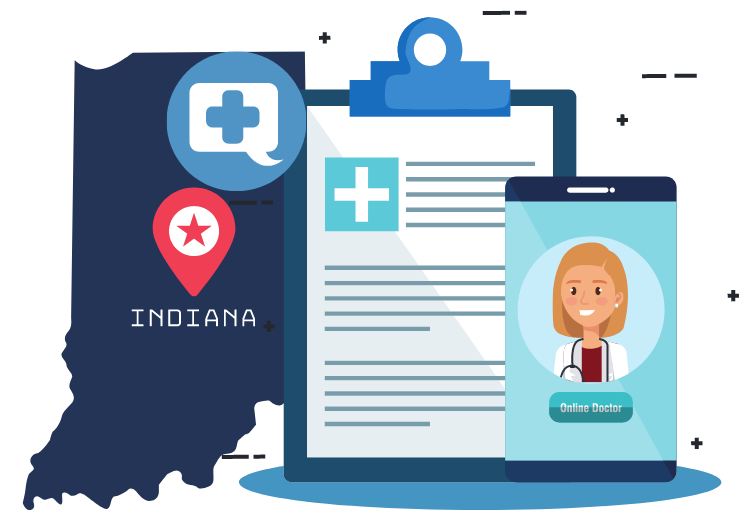
Beacon Health System

- Prescription
- HIPAA Compliant
- Board-Certified Physicians, Dietitians, Counselors, and Psychologists
X Insurance
Through Beacon Connected Care services, patients as young as six months can be accommodated by their providers online. The major services they offer can be categorized into the following:
- Behavioral Health Counseling: anxiety, bereavement, couples therapy, depression, insomnia, stress, trauma
- Nutrition Counseling:
- meal planning
- medical conditions like diabetes, digestive disorders, high blood pressure, high cholesterol, pediatric nutrition, pregnancy
- special dietary needs such as food allergies, gluten-free diets, vegetarian meals, medical conditions
- sports nutrition
- vitamins and supplements
- weight loss
- Online Urgent Care 24/7: allergies, bites, congestion, cough, diarrhea, fever, headache, nausea, pink eye, rash, sinus pain, sore throat, vomiting
- Scheduled Visits with an established provider for existing patients or other specialists for new patients
Patients, parents, or guardians are given the option to choose among their list of experienced online providers. These are medical professionals who have been certified and credentialed following the standards set forth by the National Committee for Quality Assurance (NCQA). They also form part of the country’s largest telehealth primary care group, the Online Care Group. The ratings and reviews displayed after each provider can also help clients decide which doctor to book an appointment with.
These services are available on the Beacon Connected Care app, which can be installed on Android and Apple devices. They do not accept insurance but issue a detailed receipt that patients can claim reimbursement before insurance companies. Patients must contact their insurance provider to confirm their coverage before booking any telemedicine service.
Location/City Served: South Bend

Parkview Health

- Prescription
- HIPAA Compliant
- Board Certified Physicians and Specialists
- Insurance is applicable to select services only
Parkview Health offers various options for their patients on receiving virtual care, either through Parkview MyChart or through Parkview OnDemand. To access the following services, the patient must have a MyChart account:
- E-Visit Online Tool: New patients above 18 years old and above can avail themselves of this virtual care option. It must be noted that insurance is not accepted for this type of service. Patients only need to answer an online questionnaire for this visit to be diagnosed and treated for these minor conditions:
- Back pain
- Diarrhea
- Headache
- Heartburn
- Red-eye
- Sinus problems
- Urinary problems
- Vaginal discharge
- Scheduled Video Visit: This is only available for existing patients who have been seeing a Parkview provider or specialist. Minors and adults can be accommodated either through video conferencing or phone consultation. However, virtual care for patients 14 to 17 years of age is limited to phone visits. Appointments are made with the provider’s office to determine whether virtual care is an appropriate option for the patient.
- Virtual Walk-in Clinic: New and established patients of all ages, except 14 to 17 years old, who have non-emergency medical concerns are accommodated through this option. Orthopedic specialists are also available for preliminary diagnoses of conditions associated with the bones, joints, ligaments, muscles, and tendons.
As for OnDemand video visits, patients can be as young as two years of age to schedule a video visit or phone consultation for common conditions. Their licensed psychiatrists and therapists also offer mental health services to patients 18 years old and above for various mental health issues such as anxiety, depression, grief, PTSD, and stress. OnDemand does not accept insurance.
Parkview Health strictly does not entertain broken bones, chest pain, feeling faint, injuries that require an X-ray, severe shortness of breath, or severe pain via video visits. Patients are strongly advised to call 911 or go directly to an emergency room.
Locations/Cities Served:
- Fort Wayne
- Auburn
- Huntington
- LaGrange
- Kendallville
- Comlumbia City
- Wabash
- Warsaw
- Fort Wayne

Indiana Hemophilia and Thrombosis Center
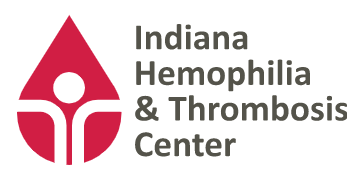
- Prescription
- HIPAA Compliant
- Board Certified Hematologists and Specialists
- Insurance
Patients with blood disorders can now have access to America’s top specialists without having to leave the comforts of their homes. Indiana Hemophilia and Thrombosis Center (IHTC) providers may render health care services through video visits if they assess that it is appropriate for the patient’s medical care. They also have pediatric specialists who can accommodate children as young as newborns. Some of the conditions they treat include:
- Autoimmune Hemolytic Anemia
- Chronic Neutropenia
- Clotting
- G6PD
- Hemochromatosis
- Hemangioma, Vascular, and Lymphatic Malformations (HVLM)
- Hemophilia
- Hereditary Hemorrhagic Telangiectasia (HHT)
- Hereditary Spherocytosis
- Myelodysplastic Syndromes
- Qualitative Platelet Disorders
- Rare Bleeding Disorders
- Sickle Cell Disease
- Thalassemia
- Thrombosis
- Von Willebrand Disease
Whether or not to accommodate patients via telemedicine depends on the provider’s sole discretion and is decided on a case-to-case basis. Treatment plans are customized to the patient’s needs and other family background and lifestyle factors.
Aside from adult and pediatric hematologists, their care team consists of genetic counselors, social workers, registered dietitians, psychologists, nurses and nurse practitioners, physician assistants, and many others. Patients can be sure to receive a comprehensive approach to their health care.
All video visits are conducted through Klara, which can be used by both Android and Apple users.
Location/City Served: Indianapolis

My Virtual Health Visit

- Prescription
- HIPAA Compliant
- Board Certified Physicians
- Insurance
My Virtual Health Visit is the telemedicine platform of Major Health Partners, which is available on both Google Play and AppStore. On-demand urgent care and scheduled visits with Suburban Health Organization hospital providers can be booked through the app, where patients can also talk with a provider via audio chat. Some of the Indiana hospitals they collaborate with are:
- Goshen Health
- Hancock Health
- Hendricks Regional Health
- Henry Community Health
- Johnson Memorial Health
- Major Health Partners
- Margaret Mary Health
- Marion General Hospital
- Riverview Health
- Witham Health Services
If your current provider is affiliated with any of the above health institutions, you can check with them if your medical case can be appropriately addressed via telemedicine. Common and non-life-threatening conditions such as the following can surely be accommodated through virtual visits:
- Back pain
- Bronchitis
- Cold
- Conjunctivitis
- Cough
- Earache
- Eye infections
- Respiratory infections
- Seasonal allergies
- Skin disorders
- Sinus infection
- Urinary tract infections
Other family members such as a child, a spouse, a parent, or son or daughter of an elderly patient can join in the video visit or have it scheduled for their medical concerns.
The myVirtualHealthVisit can also be integrated with Apple Health making it easy to share one’s vitals such as blood pressure, blood glucose levels, heart rate, nutritional information, respiratory rate, temperature, and weight provider remote visits.
Locations/Cities Served: based in Indianapolis, serving all of IN

Indy Paws Veterinary Hospital

- Prescription
- HIPAA Compliant
- Board Certified Veterinarians
X Insurance
Pet care has also gone on to explore virtual visits! Before utilizing AirVet for virtual appointments, Indy Paws started with a telemedicine platform. Telemedicine visits are afforded to current clients and patients whose last consultation was within the last twelve (12) months. The following services are available via telemedicine:
- Diarrhea as a lone symptom (not together with vomiting and lethargy)
- Evaluation of ongoing conditions
- Ear conditions
- Eye conditions
- Lameness
- Limping
- Skin conditions
- Surgery rechecks
The visits are asynchronous and mainly involves video messaging. The veterinary doctors may require an in-person visit for physical examinations or further tests of your pet. If this is the case, the cost of the virtual visit may be discounted. They also offer other services in their clinic located at 1502 N Emerson Ave, Indianapolis.
If medications are prescribed, pet owners can have the option to either pick them up at their clinic, avail of direct shipment through their online pharmacy, or have it mailed in some instances.
The most they can give is telehealth advice for new clients as they cannot give a diagnosis or medications. Appointments can be made through call, e-mail, or text.
Location/City Served: Indianapolis

Reid Health

- Prescription
- HIPAA Compliant
- Board-Certified Physicians, Specialists, and Medical Assistants
- Insurance
Reid Health uses state-of-the-art technology not just in their video conferencing equipment but as well as medical-grade digital exam cameras for a comprehensive virtual visit every time. This program is for patients outside Richmond, Indiana, to save travel time to the main facility and instead see a specialist virtually instead right in their homes or local offices at Connersville, Hagerstown, and Winchester to be assisted by a trained medical assistant.
Some of the common minor illnesses they treat via telemedicine are:
- Acid reflux
- Bites
- Bladder infection
- Cold sores
- Constipation
- Flu symptoms
- Nasal congestion
- Pink eye
- Rashes
- Sore throat
- Stings
- Stomach viruses
Aside from telemedicine visits, they also offer remote patient monitoring services for many chronic conditions such as:
- Arthritis
- Asthma
- Chronic obstructive pulmonary disease (COPD)
- Diabetes
- Depression
- Emphysema
- Heart disease
- High blood pressure
- Kidney disease
Other Reid Health specializations that can be accessed remotely are teleallergy, telecardiology, teleneurology, telepsychiatry, and telepulmonology. Patients can contact them through phone and e-mail to check if their medical case would qualify for telemedicine.
Patients without video connections for MyChart visits can use telephone-only remote visits.
Location/City Served: Richmond

The South Bend Clinic

- Prescription
- HIPAA Compliant
- Board Certified Physicians
X Insurance
DocIN is the telemedicine platform utilized by the South Bend Clinic. Through this platform, patients will be initially asked to answer a quick questionnaire about symptoms they are experiencing to receive a diagnosis and corresponding treatment for the following common medical conditions:
- Acne
- Allergies
- Bug bites
- Colds
- Conjunctivitis
- Dermatitis
- Eczema
- Eye irritation
- Irritable bowel syndrome
- Lower back pain
- Mild burns
- Mouth sores
- Runny nose
- Shingles
- Sinus infections
- Stye
- Tick bites
- Tinea infections
- Tobacco use
- Upper respiratory infections
- Vaginal yeast infections
- Women urinary tract infection (UTI)
Photos can also be attached to allow providers to see the subject medical concern such as wounds and other skin conditions. South Bend Clinic providers give personalized care plans and prescriptions within an hour during office hours. Patients can give their preferred pharmacy where the prescription can be transmitted electronically. If they would not provide you with a diagnosis and treatment plan, the questionnaire visit will not be charged.
However, if the provider reviewing the completed questionnaire determines that the patient must be seen virtually through a video visit or in-person, the provider will initiate the video visit or make the proper referral for the latter.
Location/City Served: South Bend

Norton eCare

- Prescription
- HIPAA Compliant
- Board Certified Physicians and Pediatricians
- Insurance
Patients must download the MyChart app to create an account and start availing themselves of their virtual care services. Video visits and eVisits are the two telehealth options offered through the MyNortonChart. Video visits are offered to Indiana residents two years old and above. An eVisit, on the other hand, is when patients complete an online questionnaire and is available only for existing patients of Norton Healthcare within the past three years.
Any available Norton eCare provider conducts these visits for minor illnesses such as:
- Allergies
- Cold
- Cough
- Diarrhea
- Fever
- Flu
- Insect bite
- Lice
- Nausea
- Pinkeye
- Poison ivy
- Ringworm
- Sinus infection
- Skin rash
- Sore throat
- Swimmer’s ear
- Urinary problems
- Vaginal discharge or irritation
- Vomiting
Norton Healthcare also offers breastfeeding support 24/7 for free to moms who need lactation support through their MyNortonChart account. Issues like breast tenderness, infection, latching, mastitis, milk supply, pain, plugged milk ducts, pumping, sore nipples, thrush, and weaning are covered in this type of session.
For virtual visits with a primary care provider or specialists, patients must directly book with the provider’s office to see if their medical case can be properly accommodated via telemedicine. All sessions are hosted through Zoom Cloud Meeting. For convenience, the Norton Healthcare Mobile app, which can be downloaded from Google Play or App Store, allows patients to manage their health, find providers, track their nutrition, and locate hospitals near them.
Locations/Cities Served:
- Jeffersonville
- Charlestown
- New Albany
- Clarksville

First Care

- Prescription
- HIPAA Compliant
- Board Certified Primary Care Providers, Physicians, and Nurse practitioner
- Insurance
Urgent care for non-life-threatening conditions is the main service offered by First Care. All their providers have undergone training and acquired special credentialing. They also integrate themselves into the community through various projects that benefit local schools and organizations. Patients can be sure that they will be seen by a provider who cares not just for their health but also their overall well-being.
Telemedicine virtual visits are now available to all First Care patients. Their providers can treat the following medical conditions virtually:
- Allergies
- Back pain
- Colds
- Conjunctivitis
- Diarrhea
- Gout
- Nausea
- Poison ivy
- Rashes
- Sinusitis
- Sore throat
- Upper respiratory infections
- Urinary tract infections for patients 12 years old and above
- Vomiting
- Yeast infections
They also offer medication refills through their telemedicine services. Patients can call a clinic nearest them to check if their concerns can be properly accommodated via telemedicine. If the providers cannot treat the patient’s medical concern remotely, they will refer the patient for further testing or in-person visit in one of their clinics in Bedford, Greenfield, New Castle, Richmond, and Seymour.
Other services they offer on-site include treatment of common illnesses and injuries, stitches, diagnostic testing, occupational medical services, as well as vaccines and immunizations.
Locations/Cities Served:
- Bedford
- Greenfield
- New Castle
- Richmond
- Seymour
Telemedicine Resources in Indiana
Gathering information or searching on specific telemedicine topics for Indiana can generate thousands of results. However, not all you find and read on the internet are accurate and reliable! Most websites only provide data on national and federal laws but keep in mind that different states observe different policies on telemedicine.
Check out these telemedicine resources that particularly point to the practice in Indiana:
- Indiana Professional Licensing Agency: This site is very helpful for practitioners and employers who want to expand their practice into telemedicine. All requirements, step-by-step instructions on how to go about the application process and a list of eligible practitioners are provided here.
- Upper Midwest Telehealth Resource Center: The states of Indiana, Illinois, Michigan, and Ohio can avail of the telehealth resources provided by UMTRC. This resource center mostly caters to providers rather than patients as it serves as an authority on telehealth adoption, compliance, delivery, and reimbursement. It provides training, podcasts, educational presentations, toolbox, webinars, events, and articles on meeting one’s telehealth program goals. If a provider has any difficulties with the technology utilized in rendering telemedicine services, UMTRC also offers individualized technical assistance and facilitation.
- Indiana Family and Social Services Administration: Information regarding Hoosiers’ health care, health coverage, mental health, and addiction concerning telemedicine is available on the FSSA’s page. Basic information, educational materials, instructions, contact numbers, and other data residents of Indiana may need for their telemedicine experience can be accessed here.
- Center for Connected Health Policy – IN: Current and up-to-date telemedicine information on Indiana’s reimbursement policies, Medicaid, private payer laws, and professional requirements are summarized and organized for easy reading on this Public Health Institute program. External links leading to other federal and state-run websites used as their reference can also be accessed by readers who want to see the full text of these laws and policies. Other useful information for both providers and patients on topics of online prescribing, cross-state licensing, licensure compacts, the current state of public health, and many more are also available on the site.
